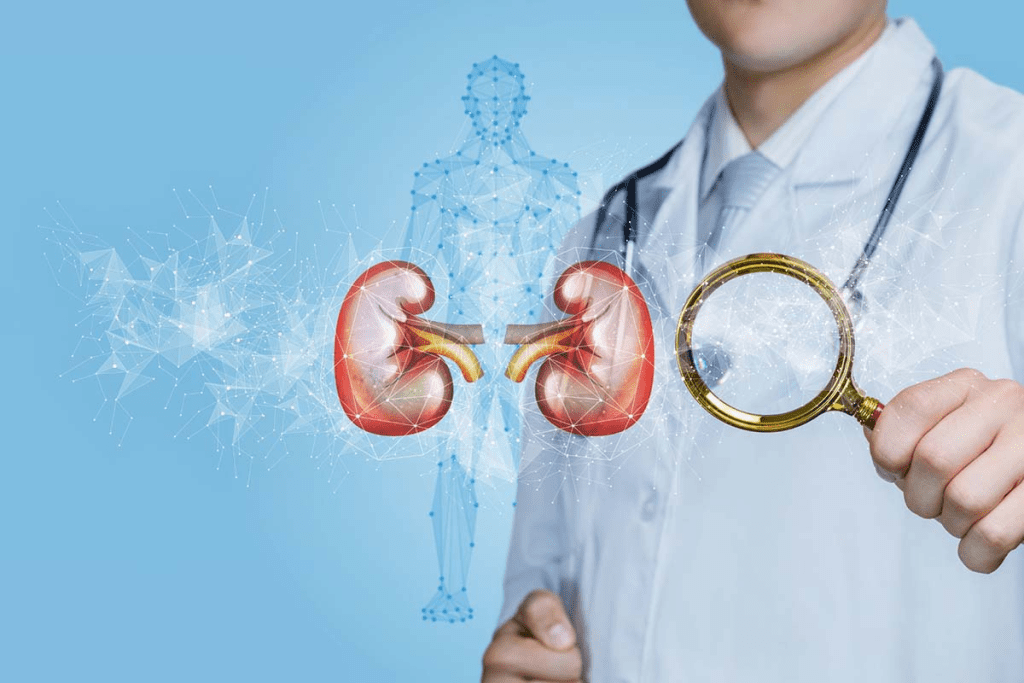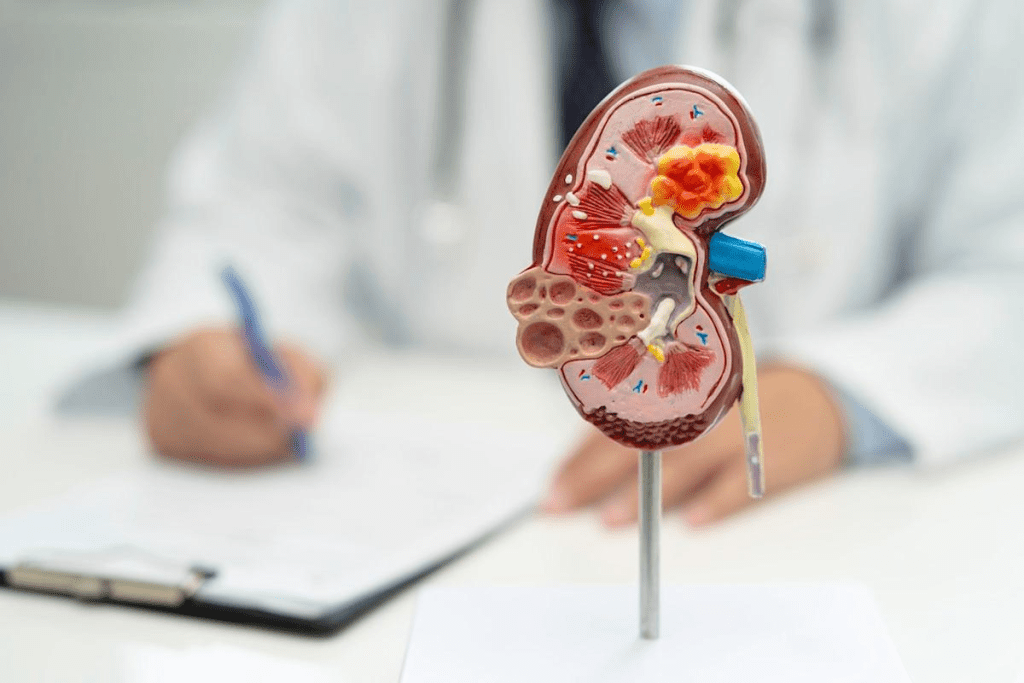Last Updated on November 25, 2025 by
Frequent urination is more than a minor issue. It may indicate kidney disease that needs attention.
At Liv Hospital, we know how annoying and worrying frequent urination can be. We aim to provide top-notch healthcare. We also offer full support and guidance for international patients.

In this article, we’ll look at kidney issues that cause frequent urination. We’ll give you the info and support you need to tackle these problems. Conditions like chronic kidney disease, infections, or diabetes-related damage may be the cause.
It’s important to understand how kidney health and urination patterns are connected. Our kidneys help filter waste and excess fluids from our blood. They work closely with our urination habits.
Healthy kidneys help control how much urine we make. They make sure waste is removed and our body’s fluid balance is kept. Normal kidney function filters about 200 liters of blood daily, making 1.5 to 2 liters of urine. This is key for our health.
“The kidneys are amazing organs that do many important jobs,” says recent research. They remove waste, balance electrolytes, and help control blood pressure. Their work shows in how often we urinate.
Kidney damage can change how often we urinate. Kidney damage or disease can make us pee more or less. Early kidney disease might make us pee a lot, while later stages might make us pee less.
Damaged kidneys can also cause other urinary problems. These include pain while urinating or blood in the pee. It’s important to notice these signs and see a doctor if they don’t go away.
Frequent urination is a common symptom in patients with Chronic Kidney Disease. This condition affects about 10% of the global population. CKD causes the gradual loss of kidney function over time.

In the early stages of CKD, the kidneys produce more urine. This leads to increased urinary frequency. Patients may need to urinate at night, disrupting their sleep.
As CKD progresses, the kidneys’ ability to concentrate urine worsens. This results in more diluted urine. Patients may experience increased urine output and frequency, affecting their quality of life.
As CKD advances, the kidneys’ filtering capacity declines. This leads to a buildup of toxins in the blood. Symptoms include changes in urination patterns, such as decreased or frequent urination.
The progression of CKD can also cause electrolyte imbalances and fluid retention. These complications further impact urination patterns.
CKD often comes with other symptoms. These include fatigue, swelling in the legs and feet, and changes in urine appearance. Symptoms like foamy urine or hematuria (blood in the urine) indicate disease progression and the need for medical intervention.
“Chronic Kidney Disease is a significant health issue worldwide, and its impact on urination patterns can be significant. Early detection and management are crucial to slowing disease progression and improving patient outcomes.”
We stress the importance of monitoring kidney function and addressing any changes in urination patterns promptly. Understanding the relationship between CKD and urination helps patients manage their condition better. This improves their quality of life.
It’s important to know how kidney infections and urinary frequency are connected. Kidney infections, like pyelonephritis, can be very uncomfortable. They can also lead to serious problems if not treated quickly.

Pyelonephritis is an infection of the kidney’s upper part. It causes frequent urination, pain while urinating, fever, and pain in the side. This happens when bacteria move up from the lower urinary tract.
Women are more likely to get pyelonephritis because of their shorter urethra. Other factors include urinary tract issues, kidney stones, and weakened immune systems.
Bacterial infections can harm the kidneys by causing inflammation and damage. When the kidneys get infected, they might not work properly. This can lead to signs of kidney failure, like changes in urination, swelling, and tiredness.
Untreated infections can lead to serious problems, like sepsis or chronic kidney disease. This shows why quick medical help is key.
Treating kidney infections usually means using antibiotics. The type and length of treatment depend on the infection’s severity and the patient’s health. Sometimes, hospital care is needed for severe symptoms or complications.
Along with antibiotics, staying hydrated and avoiding irritants can help manage symptoms. For those who keep getting infections, more tests might be needed to find the cause.
Knowing about kidney infections and their effects is crucial for managing them well. Recognizing symptoms early and getting medical help can prevent long-term damage. This helps keep kidneys healthy.
Interstitial nephritis is a rare kidney issue. It causes more urine because of kidney inflammation. This makes it hard for the kidneys to hold water and concentrate urine, leading to various symptoms.
The kidneys have complex parts that can get inflamed. In interstitial nephritis, the inflammation hits the spaces between the kidney tubules. This hurts the kidneys’ function, causing symptoms like more urine.
We will look into how this inflammation impacts kidney function and the symptoms it causes. Knowing how it works is key to managing it well.
Many things can cause interstitial nephritis, like some medicines, infections, and diseases. Some common causes include:
Knowing these causes and risks is important for preventing and treating interstitial nephritis. We will talk about how to avoid these risks and handle the condition quickly.
Diagnosing interstitial nephritis involves clinical checks, lab tests, and sometimes a kidney biopsy. Treatment aims to fix the cause, reduce inflammation, and help the kidneys work better.
Treatment might include stopping bad medicines, using corticosteroids to lower inflammation, and managing symptoms. We will explain how to diagnose and manage it, making sure patients get the best care.
In some cases, interstitial nephritis is linked to other issues, like liver disease. This can lead to liver failure symptoms. It’s important to understand these connections for complete patient care.
Diabetes can cause you to urinate a lot. It’s a big risk for kidney disease. We’ll look at how high blood sugar harms kidneys, the damage it causes, and how to prevent and treat it.
High blood sugar can harm the kidneys over time. It affects their ability to filter waste and fluids. The kidneys have tiny vessels called glomeruli that filter waste from the blood.
When blood sugar is high, these vessels can get damaged. This makes the kidneys less good at removing waste. This can lead to a buildup of toxins in the body.
Key effects of high blood sugar on kidney filtration include:
Diabetic nephropathy goes through stages. It starts with hyperfiltration, then microalbuminuria, and finally macroalbuminuria. Symptoms may not show up early, but can include:
As it gets worse, it can lead to end-stage renal disease (ESRD). This means the kidneys can’t support the body, and dialysis or a transplant may be needed.
To prevent diabetic nephropathy, manage blood sugar, and live healthily. This includes:
For those with diabetic nephropathy, treatments aim to slow the disease. This includes medicines for blood pressure and proteinuria, and lifestyle changes to manage diabetes and protect the kidneys.
“Early detection and management of diabetes and its complications are crucial in preventing the progression to diabetic nephropathy and end-stage renal disease.”
Frequent urination can signal many kidney issues, like chronic kidney disease and diabetes damage. At Liv Hospital, we focus on caring for patients with kidney problems. We aim to provide top-notch care and support.
Men who often need to pee should know it might be a sign of something serious. This could include conditions linked to HIV. We urge everyone to see a doctor to get these issues checked out.
Knowing about kidney problems can help you take care of your kidneys. Our team is here to offer world-class healthcare. We also provide support and guidance for international patients.
Frequent urination can be a sign of kidney issues like chronic kidney disease, infections, or diabetes damage. We’ll look at the kidney problems that can cause this symptom.
Damaged kidneys can change how often you need to urinate. Normally, they filter waste and excess fluids from your blood, controlling urine production.
CKD’s early stages can make you urinate more often. As it gets worse, you might feel tired, have swelling, and notice changes in your urine.
Pyelonephritis is a kidney infection that can make you urinate more, hurt while you do it, and cause fever. It’s important to get medical help quickly because it can harm your kidneys.
Interstitial nephritis is when the kidney’s inner parts get inflamed, leading to more urination. It can be caused by some medicines and certain conditions.
Diabetes can cause you to urinate a lot. High blood sugar can damage your kidneys over time, making it hard for them to filter waste and fluids.
Your kidneys are in the lower back, one on each side of your spine. Kidney pain is felt in the flank area, just below your ribcage. Knowing where your kidneys are can help you spot potential problems.
Kidney failure symptoms include changes in how often you urinate, feeling tired, swelling, and nausea. If you have these symptoms, you should see a doctor right away.
Liver disease and liver failure are different from kidney disease but can be related. Liver disease symptoms include jaundice, feeling tired, and changes in appetite.
HIV symptoms in men can vary, but some may have kidney problems due to HIV-associated nephropathy. It’s important to get regular medical check-ups to manage HIV and keep your kidneys healthy.
Subscribe to our e-newsletter to stay informed about the latest innovations in the world of health and exclusive offers!